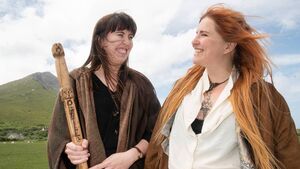The legend of Granuaile lives on

Grace O'Malley, the current chieftan of the O'Malley Clan (left), pictured with Polina Shapkina who played Grace O'Malley in Circus 250's fabulous show 'Grace: The Story of a Pirate Queen', which was performed on Achill Island as part of the Grace Day Festival. Picture: Alison Laredo
On the island where one of her famous castles still stands sentry, the legend of Granuaile came alive in spectacular fashion late last month.
The premiere of ‘Grace: The Story of a Pirate Queen’ took place on Silver Strand in Dugort, on the northern end of Achill Island, a stone’s throw from the seas the famous Grace O’Malley once sailed and ruled, part of a ‘Day of Grace’ series of events.
It was a fabulous depiction of her life by an all-female cast of performers and acrobats in an open-air show on a, mercifully, dry June Saturday.
It was put on by Achill-based Circus 250 and close to 500 people gathered to watch which serves as a reminder of how Granuaile’s legend is not fading from history with the passing of time but, if anything, is surging. The audience included two busloads of O’Malleys from all over the world, from the O’Malley Clan Association, who were in Mayo for their annual gathering.
Children sat at the front, agog, at what they thought must have been a fine act of fiction as the life and times of Granuaile was relived. The beauty of it was that it resonated with all ages with an original score composed by Ursula Burns created for it.
It featured the finest of acting, singing, music and some stunning acrobats. We’re not sure if Granuaile could do an aerial hoop, but, given her spectacular displays at sea in high winds, we wouldn’t put it past her.
Italian actress Francesca Martello played Queen Elizabeth and was utterly magnificent. Polina Shapkina played Grace O’Malley and was perfect for the role, her red hair blowing in the Achill wind bringing echoes of Granuaile as did her defiant performance.
The only onlookers who showed any signs of disinterest were the local rambling sheep who frequently demonstrate an arrogance about what is and is not their domain that would make an English imperialist in the era of Granuaile blush.
The show is expected to go on tour. If it turns up near you, we highly recommend going to watch it. You won’t regret it.
Its creative director is Dea Birkett, the driving force behind Circus 250.
For many present we spoke to it served as an education on the layered story of a lady who has been dubbed ‘The Pirate Queen’.
To recap, Grace O’Malley was born around 1530 and was the daughter of an Irish chieftain.
Ireland was declared a kingdom under the English crown in 1542 by Henry VIII. Many Irish chieftains acquiesced but the O’Malleys did not. Grace O’Malley took over as clan leader upon her father’s death in the 1560s. That it was not the eldest son that did so was out of sync with the norms of the time, but spoke to her already impressive capabilities at sea and her strong, defiant leadership.
She ruled the seas around Mayo and Galway, often, it seemed, more comfortable at sea than on dry land. Her son, Theobald (Tibbott), who would go on to become the first Lord Mayo, was born at sea, a scene recreated in ‘Grace: The Story of a Pirate Queen’.
The most renowned moment in her life was the fabled meeting with Queen Elizabeth I in Greenwich in 1593.
What precipitated it was the rule of the infamous governor of Connacht, Sir Richard Bingham, appointed in 1584, whose efforts to overthrow her realm deprived her of much of her income. She exchanged letters with the Queen about her struggles and when her son Theobald was arrested, she departed for London to seek an audience with the Queen.
Many opponents of the queen only came to London to be hanged but Queen Elizabeth entertained Granuaile and, it would appear, largely acceded to her requests.
The meeting of these two women – from vastly different backgrounds and lived experiences – is played out brilliantly in ‘Grace: The Story of a Pirate Queen’.
‘Can they compromise?’ is sung while in brilliant slapstick, the two queens play out a game of Rock-Paper-Scissors.
The narrator evocatively sets out the contrast after the meeting:
“And at night, in her giant four poster bed, inside her palace walls, with uniformed guards at the bedroom door, Queen Elizabeth dreams of the Pirate Queen who fights for her freedom, sailing open waters, where the wind still dances.”
The catchy moniker ‘pirate queen’ has stuck with her although I feel it somewhat undermines her genuine legitimacy at a time of English conquest of Ireland.
have described her as ‘the fiercest female in Irish history’ and it is hard to argue. But it is only inside the last 50 years that Granuaile has started to receive the attention her story merits.
Castlebar native Anne Chambers has rightly been credited with reawakening the legend of Granuaile in the modern day, thanks to her seminal 1979 biography and associated works since.
A Granuaile centre was established in Louisburgh in the early 1980s and her castles at Clare Island, Kildawnet on Achill Island and Rockfleet, outside Newport, have always been popular tourist attractions.
But it does feel as if it is only in the past decade that something approaching the full potential of the legend of Granuaile is being realised.
‘Grace: The Story of a Pirate Queen’ is an example. ‘The Two Graces’ sculptures in Newport is another, as is ‘The Grace’ Hotel in Westport. Successful whiskey and gin brands show the commercial potential while a feature film is in the offing.
There is great potential, particularly, in plans for a Granuaile Trail, linking the many sites connecting her and her family in Mayo.
Granuaile should be one of the single biggest persons, places or things we in Mayo talk about to the outside world. A unique, heroic figure from our own shores.
She is a very empowering female symbol. In a time of massive patriarchy, one which held a very strong grip until relatively recently, here was a woman of this county who was defiant, swashbuckling, pragmatic and resilient.
“She shines as an inspirational beacon to what women can achieve, like her, even in the most demanding and difficult environments,” said Anne Chambers.
You get the feeling we’re only beginning to scratch the surface.





